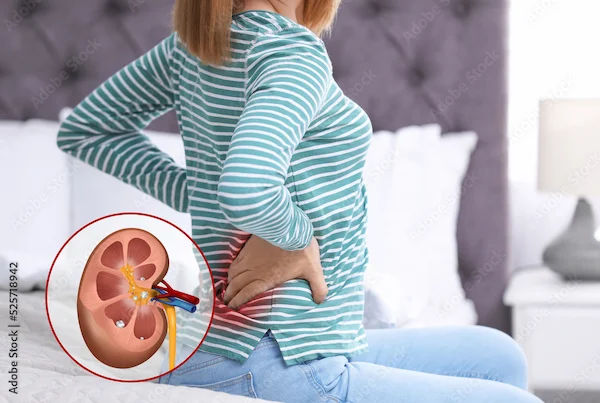Kidney Stones Myths: Debunking Common Misconceptions
There are many myths about kidney stones, from causes to treatments. Learn the truth about common misconceptions, including diet, hydration, and prevention strategies, to better manage kidney stone risks.

Written by
Last updated on 3rd Jul, 2025
Introduction
Kidney stones are a common and often painful condition affecting millions of people worldwide. Despite their prevalence, there are many myths and misconceptions surrounding kidney stones that can lead to unnecessary fear, misinformation, and inappropriate treatment. This article aims to debunk some of the most common myths about kidney stones, providing accurate information to help you better understand this condition.
Common Kidney Stones Myths
Kidney stones are often misunderstood, with many myths surrounding their causes and treatment. Here, we’ll debunk some common misconceptions to help you better understand this condition.
Myth 1: Only Adults Get Kidney Stones
Reality: While kidney stones are more common in adults, children and adolescents can also develop them. The incidence of pediatric kidney stones has been rising in recent years, likely due to changes in dietary habits, such as increased consumption of high-sodium and low-water diets. It's important for parents and caregivers to be aware that children can experience kidney stones and to seek medical attention if symptoms such as severe abdominal or back pain occur.
Myth 2: Drinking Milk Causes Kidney Stones
Reality: Contrary to popular belief, consuming calcium-rich foods like milk does not cause kidney stones. In fact, dietary calcium can help prevent the formation of certain types of kidney stones, such as calcium oxalate stones. When calcium binds with oxalate in the gut, it reduces the amount of oxalate absorbed into the bloodstream and excreted in the urine, thus lowering the risk of stone formation. However, calcium supplements should be taken with caution and under the guidance of a healthcare professional.
Myth 3: All Kidney Stones Are the Same
Reality: There are several types of kidney stones, each with distinct causes and characteristics. The four main types of kidney stones are:
Calcium Oxalate Stones: The most common type, formed when calcium binds with oxalate in the urine.
Calcium Phosphate Stones: Formed when calcium combines with phosphate, often linked to metabolic conditions.
Uric Acid Stones: These develop when the urine is too acidic. They are commonly associated with diets high in purines, such as red meat and shellfish.
Struvite Stones: Usually form in response to a urinary tract infection and can grow quickly and become quite large.
Each type of kidney stone requires different preventive measures and treatments, so it’s essential to identify the specific type to manage the condition effectively.
Myth 4: Kidney Stones Are Caused Solely by Dehydration
Reality: While inadequate water intake is a significant risk factor for kidney stones, it is not the only cause. Other factors contributing to kidney stone formation include dietary habits, genetic predisposition, metabolic disorders, obesity, and certain medical conditions such as hypercalciuria (excessive calcium in the urine) and gout. It's important to address all potential risk factors to effectively prevent kidney stones.
Myth 5: Passing a Kidney Stone Is Always Extremely Painful
Reality: The pain associated with passing a kidney stone varies depending on the stone’s size, shape, and location. While larger stones can cause intense pain, smaller stones may pass with minimal discomfort or even go unnoticed. Some individuals may experience only mild discomfort or cramping as the stone moves through the urinary tract. It's essential to seek medical attention if you experience severe pain, as it may indicate a larger stone or other complications.
Myth 6: Once Treated, Kidney Stones Won’t Return
Reality: Kidney stones have a high recurrence rate. Approximately 50% of individuals who experience kidney stones will develop another stone within five years if preventive measures are not taken. To reduce the risk of recurrence, it’s crucial to adopt lifestyle changes, such as staying well-hydrated, following a kidney-friendly diet, and addressing any underlying medical conditions.
Myth 7: Cranberry Juice Prevents Kidney Stones
Reality: While cranberry juice is often recommended for preventing urinary tract infections (UTIs), it does not have the same effect on kidney stones. Cranberry juice is acidic and can increase the excretion of oxalate in the urine, which may contribute to the formation of calcium oxalate stones. For kidney stone prevention, it’s better to focus on staying hydrated with water and consuming citrus juices like lemonade, which contain citrate that can help prevent stone formation.
Myth 8: Olive Oil and Lemon Juice Help Pass Stones
Reality: There is no scientific evidence to support the claim that drinking a mixture of olive oil and lemon juice can help pass kidney stones. While lemon juice contains citrate, which can inhibit stone formation, the combination with olive oil is unlikely to provide any significant benefit in passing existing stones. Instead, it’s essential to follow medical advice and treatment plans prescribed by healthcare professionals.
Myth 9: Kidney Stones Are Related to Gallstones
Reality: Kidney stones and gallstones are not related. They form in different organs and have distinct causes. Kidney stones form in the kidneys and urinary tract from the crystallisation of minerals and salts, whereas gallstones form in the gallbladder from cholesterol or bilirubin. Each condition requires different treatments and preventive measures.
Myth 10: You Won’t Get Kidney Stones if No One in Your Family Has Them
Reality: While having a family history of kidney stones increases your risk, many people develop kidney stones without a genetic predisposition. Other factors, such as diet, hydration, and underlying medical conditions, play a significant role in stone formation. Therefore, it’s possible to develop kidney stones even if no one in your family has had them.
Lifestyle Changes and Prevention of Kidney Stones
Understanding the myths and the real facts about kidney stones is essential for preventing them and managing the condition effectively. By knowing what truly contributes to kidney stone formation, you can take the right steps to reduce your risk. Here are some simple, evidence-based tips that can help you lower the chances of developing kidney stones:
Stay Hydrated
One of the most important steps in preventing kidney stones is drinking plenty of water throughout the day. When you’re well-hydrated, you produce more urine, which helps dilute substances like calcium and oxalate that can form stones. Aim to drink at least 8-10 cups of water a day, and more if you're physically active or live in a hot climate. The goal is to produce at least 2 litres of urine daily.
Follow a Balanced Diet
A diet rich in fruits, vegetables, and whole grains provides essential nutrients that help prevent kidney stones. These foods can reduce the concentration of minerals in your urine that lead to stone formation. Additionally, eating a variety of healthy foods helps you maintain an overall balanced system, which lowers the risk of kidney stones.
Limit Sodium Intake
High salt (sodium) intake can increase calcium levels in the urine, which is a major risk factor for kidney stones. Reduce your consumption of processed foods, canned soups, salty snacks, and restaurant or fast food. Instead, opt for fresh, home-cooked meals where you can control the amount of salt added. Using herbs and spices for flavour instead of salt can also help.
Control Animal Protein Intake
Diets high in animal protein (such as red meat, eggs, and shellfish) can increase the risk of kidney stones, especially uric acid stones. If you’re prone to stones, consider moderating your intake of animal-based proteins and incorporating plant-based protein sources like beans, lentils, and tofu.
Get Enough Calcium from Food
While it may seem counterintuitive, dietary calcium is important for preventing kidney stones, particularly calcium oxalate stones. Getting calcium from food sources like dairy, leafy greens, and fortified plant-based milk can help bind with oxalates in the gut and prevent them from being absorbed into the bloodstream. Avoid calcium supplements unless advised by your healthcare provider, as excessive calcium intake from supplements may increase your risk of stones.
Avoid Excessive Vitamin C
High doses of vitamin C supplements can increase oxalate levels in the urine, which can lead to the formation of calcium oxalate stones. Stick to the recommended daily intake of vitamin C (90 mg for men, 75 mg for women) from foods like citrus fruits, strawberries, and bell peppers. If you take vitamin C supplements, be sure to consult with your doctor about the right dose.
Maintain a Healthy Weight
Being overweight or obese increases the risk of developing kidney stones, particularly uric acid stones. Maintaining a healthy weight through regular physical activity and a balanced diet can help reduce this risk. Aim for at least 30 minutes of moderate exercise most days of the week.
Manage Underlying Medical Conditions
Certain medical conditions, like hypercalciuria (excess calcium in the urine), gout, and metabolic disorders, can increase your risk of kidney stones. If you have any of these conditions, work with your healthcare provider to manage them properly. Medications may be prescribed to help control calcium levels or uric acid in the body.
Limit Oxalate-Rich Foods
Oxalates are naturally occurring compounds found in many foods, such as spinach, rhubarb, beets, and chocolate. For people prone to calcium oxalate stones, it’s a good idea to limit foods high in oxalates. However, don’t eliminate them completely, as they are a healthy part of your diet. Moderation is key, and eating these foods with calcium-rich foods can help reduce their impact on stone formation.
Consult a Dietitian or Doctor
If you have had kidney stones in the past, it’s helpful to work with a healthcare provider or dietitian to create a personalised plan for prevention. They can assess your diet, hydration habits, and medical conditions, and give you advice tailored to your specific needs. Regular check-ups are important to monitor your kidney health and prevent recurrence.
Conclusion
Kidney stones are a common medical condition surrounded by numerous myths and misconceptions. By debunking these myths and understanding the realities, individuals can take appropriate steps to prevent and manage kidney stones effectively. Staying well-hydrated, following a balanced diet, and addressing underlying medical conditions are key to reducing the risk of stone formation. Always seek medical advice and follow evidence-based guidelines to ensure the best possible outcomes for kidney stone prevention and treatment.
Consult Top Nephrologists
Consult Top Nephrologists

Dr Vinay Kumar A V
Nephrologist
8 Years • MBBS, MD - General Medicine, DM - Nephrology
Bilaspur
Apollo Hospitals Seepat Road, Bilaspur

Dr Ajay Kumar Sharma
Transplant Specialist Surgeon
39 Years • MBBS, MS, DNB, FRCS (Glas), FRCS (Edin), FRCS (General Surgery), MSc Medical Education
Delhi
Apollo Hospitals Indraprastha, Delhi

Dr. Aswini Kumar Panigrahi
Nephrologist
23 Years • MBBS, MD (Int. Med.), DNB Nephro
Hyderabad
Apollo Hospitals Jubilee Hills, Hyderabad
(200+ Patients)

Dr. Pardha Saradhi
Nephrologist
9 Years • MBBS, MD-DNB (Gen. Med.), DNB (Nephro)
Hyderabad
Apollo Hospitals D R D O kanchanbagh, Hyderabad
(50+ Patients)

Dr. Hareesha Babu K
Nephrologist
25 Years • MBBS, MD (General Medicine), DM (Nephrology),FASN, FRCP(Glasg), FRCP (Edin)
Bangalore
Kidney & Hypertension Care, Bangalore

